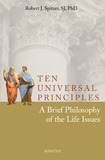The path from legal to "normal" to "moral" to deep cultural problems
National Catholic Register talks with Fr. Robert Spitzer, S.J., about his new book, Ten Universal Principles: A Brief Philosophy of the Life Issues:
The book is a wake-up call for the whole culture, to avoid what you describe as "widespread abuse of human beings and a general decline in culture." Obviously, abortion is a leading indicator of this decline. How has it caused a decline in our culture?
What becomes legal becomes normal, and because it is legally sanctioned, what becomes normal becomes moral. And
 that is a problem. Legal sanction leads to normality. Normality leads to some sort of moral sanction — everybody is doing it. So what we have is a general cultural problem.
that is a problem. Legal sanction leads to normality. Normality leads to some sort of moral sanction — everybody is doing it. So what we have is a general cultural problem.
So I took the 10 principles that ground any healthy civilization and I said: "Here is what civilization rests on and has always rested on." People know that if you give up objective truth then we are left with the strongest will or influential will, or whoever can get the most money mustered for a campaign win. Might makes right. Anytime you have these 10 principles undermined you have very deep cultural problems.
More than once you call for the overturning of Roe v. Wade in the book, based on these 10 sound principles. Do you think we are getting anywhere close to that possibility?
It is my understanding from friends in the legal establishment … that most judges do not think that Roe v. Wade is good law and the ones who do think so are not that smart. Our judges are seeing a problem with the law. But they like the policy behind the law. So there is an advantage and a disadvantage right now. More and more people see abortion as wrong. One of the key things in the case against abortion is interuterine photography. These are exceedingly good cameras. You are looking right at your baby. It's hard to say this is not a human being. So technology is in our favor. It is pushing back viability. It is now at 26 weeks, I believe.
So law and science are working for us, but one missing leg in this three-legged stool is education. I think lawyers are getting antsy, and technology is in our favor, but we are not doing the educational job yet. Our educators are not aware of the 10 principles. I wanted to write a book that would bring all of these things together in a sort of subtle way — the law, the science and the need for greater education on the life principles.
Read the entire interview, conducted by Fr. Matthew T. Gamber, S.J.
Ten Universal Principles: A Brief Philosophy of the Life Issues is also availabe in e-book format.
Carl E. Olson's Blog
- Carl E. Olson's profile
- 20 followers



